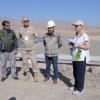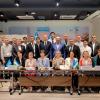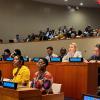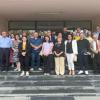News
Displaying Results 26 - 50 of 1315
With 80 Public Private Partnerships (PPP) projects in its pipeline, more than 50 signed agreements, and a solid and balanced legal and regulatory framework, Kyrgyzstan is rapidly emerging as one of the most advanced PPP markets in Central Asia. Transport, energy, education and healthcare are among…
UNECE is supporting Turkmenistan to strengthen efforts on its sustainable energy transition and to deliver methane emissions reductions from the energy sector, in alignment with global climate objectives.
This was the focus of discussions this week between Mr. Dario Liguti, Director of the…
Best available techniques (BATs) have emerged as a key policy tool to prevent and control the emission of industrial pollutants, and thereby to ensure the protection of human health and the environment. Applying BATs to different sources is a key requirement for Parties to the latest three…
Sound emission inventories are the first step for designing effective clean air policies as they provide information about the main sources and the most acute air pollution problems in a country.
Under the Convention on Long-range Transboundary Air Pollution (Air Convention), UNECE has…
Transformative innovation, or innovation that accelerates sustainable transformations, is the driving force behind redefining how we live, work, and interact with our world—sparking fundamental shifts in our consumption, production, and the creation of social value. This concept lies at the heart…
Petite forests, or small, dense clusters of native trees, are designed for compact urban spaces like streets, plazas, and schoolyards. These micro-forests offer significant benefits for enhancing biodiversity, combating climate change, and fostering community engagement.
The UN Petite Forest…
On the heels of the Summit of the Future and adoption of the Pact for the Future, the first Hamburg Sustainability Conference (7-8 October) gathered international policy makers, business leaders and civil society to discuss ways to accelerate SDG implementation. Attending the conference, UNECE…
The building sector is the largest consumer of energy in the Republic of Moldova, representing 53 per cent of final energy consumption in 2022, with public sector buildings accounting for less than one-fifth and residential buildings for the rest. The crucial aspect that influences energy…
Turkmenistan is a landlocked developing country in Central Asia with a population of some 6.4 million people, with 49% living in urban areas. In 2022, 95% of the population used a safely managed drinking water service.
On 3 October UNECE and the WHO Regional Office for Europe (WHO/…
UNECE, in close collaboration with the UN Women Regional Office for Europe and Central Asia, will convene the interministerial Beijing+30 Regional Review Meeting - “Reviewing 30 years of Beijing Commitments to Accelerate Gender Equality in the UNECE Region” - on 21-22 October 2024 in Geneva,…
Addressing the Plenary of the Summit of the Future during the UN General Assembly, UNECE Executive Secretary Tatiana Molcean noted that with its strong normative footprint, UNECE is fully dedicated to leveraging and adapting its tools, expertise, and partnerships to reinvigorate the implementation…
With its mining industry set to expand, Uzbekistan is taking steps to strengthen the safety of Tailings Management Facilities (TMFs), thanks to practical training organized by UNECE. The 3-day training session this week brought together representatives from national authorities, mining operators,…
The five Regional Commissions of the United Nations and the Permanent Mission of Chile organized during the Action Days of the Summit of the Future in New York the side-event entitled: “Towards a society for all ages: building solidarity and equity across generations”. On the occasion the Regional…
The Principles and Actionable Recommendations for Critical Energy Transition Minerals (CETM) developed by the UN Secretary-General’s Panel set a clear mandate for a global transformation in resource governance.
As Clovis Freire, Chief, Commodity Research and Analysis Section, at UNCTAD, emphasized…
Uzbekistan, the most populated Central Asian country with some 35 million people, faces water stress and inefficient water use. In addition, as a major producer of gold and uranium with its rapidly developing mining industry, the country is exposed to increasing environmental and health risks…
While nitrogen is vital for plant growth, excessive and inefficient use of this nutrient means up to 80% of it leaks into the environment, mostly in various polluting forms of nitrogen: ammonia and nitrogen oxides, which are harmful air pollutants; nitrous oxide, a potent greenhouse gas; and…
After Morocco (2022) and Mauritania (2023), the UNECE Environmental Performance Reviews (EPR) continue to reach beyond the region of the United Nations Economic Commission for Europe (UNECE). Mongolia has requested UNECE to undertake its second review, following the first in 2017.
Today, a…
Following the decision of Parties to the UNECE Convention on Long-range Transboundary Air Pollution (Air Convention) to revise the Protocol to Abate Acidification, Eutrophication and Ground-Level Ozone (Gothenburg Protocol), which is expected to further strengthen efforts to reduce air pollution in…
Results of an international survey conducted by the UNECE Conference of European Statisticians (CES) to explore the use of generative AI within statistical organizations reveal the profound impacts that AI is having on the field of official statistics.
The survey, carried out in June…
South Sudan, the world’s newest nation and a landlocked country in Eastern Central Africa, is situated in the middle of the basin of the Nile River, Africa’s longest river. Sharing significant transboundary wetlands, experiencing annual catastrophic floods and droughts and facing immense…
Civil society plays a vital role in addressing major environmental challenges. To fully harness this potential, ongoing efforts are essential to uphold the public rights to promote effective and inclusive environmental governance and a clean, healthy and sustainable environment.
To tackle…
Taking part in the High-Level Political Forum on Sustainable Development in New York (8 – 17 July), UNECE Executive Secretary Tatiana Molcean presented UNECE regional perspectives on SDGs localization, climate action, energy, transport, water and engaged with civil society, youth, and the private…
As Europe advances towards a green and digital economy, the demand for Critical Raw Materials (CRMs) - such as lithium, nickel, rare earth elements and cobalt - is surging. The European Critical Raw Materials Act (CRMA) aims to secure stable and resilient CRM supply chains by setting…
Technological advances have brought down the C02 emission intensity of GDP in the UNECE region by 31% from 2010 to 2020. But progress on climate action remains far too slow. Each one of the past twelve months has been the hottest such month on record. The cost of extreme weather events, such as…
The shift towards the digital exchange of trade data and documents can improve efficiency, reduce costs, enhance transparency, and enable better accessibility to and analysis of data. Furthermore, it has the potential to foster greener and more inclusive trade. Yet, efforts to digitalize data and…























